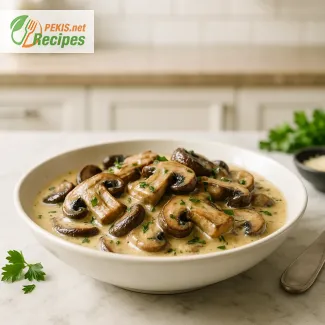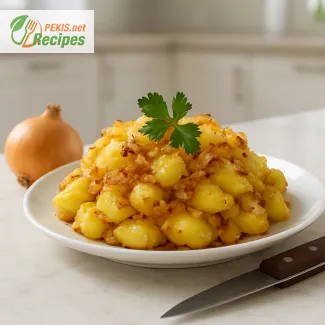
Vegetable moussaka with potatoes and eggplant is a flavorful and comforting dish that brings the best of Mediterranean cuisine to your table. This layered casserole is a vegetarian twist on the traditional Greek moussaka, where tender slices of eggplant and potatoes are combined with a rich tomato-based sauce and a creamy béchamel topping. It's a wholesome, hearty meal that satisfies both the palate and the soul.
At the heart of this dish are the eggplants, which are roasted to perfection to bring out their naturally sweet, smoky flavor. Sliced potatoes add a starchy richness, absorbing the savory juices of the sauce, making every bite melt in your mouth. The tomato sauce, made with fresh tomatoes, garlic, onions, and a blend of aromatic herbs like oregano, thyme, and cinnamon, adds a depth of flavor that elevates the entire dish. These Mediterranean spices balance the sweetness of the vegetables, creating a harmonious blend of tastes that is both comforting and exciting.
The final touch is the creamy béchamel sauce, generously spread over the vegetable layers. Made from butter, flour, and milk, this silky sauce is often infused with a hint of nutmeg, adding a warm and subtle flavor to the dish. As the moussaka bakes in the oven, the béchamel forms a golden crust that is irresistibly crispy on the outside, while remaining soft and velvety underneath.
Vegetable moussaka with potatoes and eggplant is not only delicious but also highly versatile. It can be served as a main course or as a side dish, making it perfect for both casual family dinners and more formal gatherings. It's a dish that appeals to vegetarians and meat-lovers alike, offering a satisfying and nutritious meal packed with fiber, vitamins, and minerals.
This dish pairs beautifully with a fresh green salad, crusty bread, or a glass of robust red wine, bringing a touch of the Mediterranean sun to your dining experience. Whether you are new to moussaka or a seasoned fan, this vegetable version offers a delightful variation that’s rich in texture and flavor, perfect for those looking to enjoy a lighter, plant-based version of this classic comfort food.
1. Prepare the Vegetables:
- Preheat your oven to 200°C (390°F).
- Lay the eggplant slices on a baking tray lined with parchment paper. Drizzle with olive oil, season with salt and pepper, and bake for 20 minutes until golden and tender. Set aside.
- Boil the potato slices in salted water for 10 minutes until just tender but not fully cooked. Drain and set aside.
2. Make the Tomato Sauce:
- In a large skillet, heat 2 tbsp of olive oil over medium heat. Add the chopped onion and sauté until soft, about 5 minutes. Add the garlic and cook for an additional minute.
- Stir in the canned tomatoes, tomato paste, oregano, thyme, cinnamon, and nutmeg. Season with salt and pepper. Let the sauce simmer for 10-15 minutes until it thickens slightly. Remove from heat and set aside.
3. Make the Béchamel Sauce:
- In a medium saucepan, melt the butter over medium heat. Add the flour and whisk continuously for about 2 minutes to cook out the raw flour taste.
- Gradually pour in the warm milk, whisking constantly to avoid lumps. Continue whisking until the sauce thickens, about 5-7 minutes.
- Add the nutmeg and season with salt and pepper. If desired, stir in the parmesan cheese for extra richness. Set aside.
4. Assemble the Moussaka:
- In a large baking dish, layer half of the potato slices to form the base.
- Add a layer of eggplant slices on top of the potatoes.
- Spread half of the tomato sauce over the eggplants.
- Repeat with another layer of potatoes, eggplant, and the remaining tomato sauce.
- Finally, pour the béchamel sauce evenly over the top of the moussaka.
5. Bake the Moussaka:
- Reduce the oven temperature to 180°C (350°F).
- Bake the assembled moussaka for 40 minutes, or until the top is golden and bubbling.
- Let the moussaka cool for 10 minutes before serving to allow the layers to set.
Enjoy your homemade vegetable moussaka, a perfect blend of Mediterranean flavors with creamy, savory layers that will delight your taste buds!
The nutritional components of Vegetable Moussaka with Potatoes and Eggplant provide a well-balanced mix of macronutrients, vitamins, and minerals that impact various aspects of our health. Let’s break down how the ingredients and nutrients affect the body:
Eggplants:
Eggplants are the star of this dish and offer multiple health benefits. They are low in calories but high in fiber, making them excellent for digestion and promoting satiety. The fiber content in eggplants helps regulate blood sugar levels by slowing down the absorption of sugar in the bloodstream. They are also a good source of antioxidants, particularly nasunin, a type of anthocyanin found in the skin of eggplants. Nasunin helps protect cells from oxidative damage, which is linked to aging and various diseases, including heart disease.
Health Benefits:
- Promotes digestion
- Supports heart health
- Regulates blood sugar
Potatoes:
Potatoes provide complex carbohydrates, which serve as the primary source of energy for the body. They are rich in vitamin C and potassium, both of which are important for immune function and heart health. Potassium helps regulate blood pressure by counterbalancing the effects of sodium. While potatoes often have a reputation for being high in starch, when consumed in moderation, they offer essential nutrients that are crucial for energy production and maintaining muscle function.
Health Benefits:
- Source of energy
- Supports immune system
- Helps regulate blood pressure
Tomatoes (Tomato Sauce):
Tomatoes are rich in lycopene, a powerful antioxidant that has been linked to reducing the risk of certain cancers, particularly prostate cancer. Lycopene also promotes heart health by reducing inflammation and preventing oxidative stress on cells. Additionally, tomatoes are a good source of vitamin C and vitamin K, which contribute to bone health and immune function.
Health Benefits:
- Rich in antioxidants
- Reduces cancer risk
- Promotes heart health
Olive Oil:
Olive oil is a key component in Mediterranean diets and is known for its heart-healthy benefits. It contains monounsaturated fats, which help lower bad cholesterol (LDL) levels while maintaining or even increasing good cholesterol (HDL) levels. Olive oil is also rich in antioxidants and has anti-inflammatory properties, which can reduce the risk of chronic diseases such as heart disease and stroke.
Health Benefits:
- Lowers bad cholesterol
- Supports heart health
- Anti-inflammatory properties
Garlic and Onion (Tomato Sauce):
Both garlic and onions are potent sources of allicin, a compound with anti-inflammatory, antimicrobial, and heart-protective properties. Garlic is particularly effective in lowering cholesterol and blood pressure, while onions are rich in quercetin, a flavonoid that reduces inflammation and supports immune health.
Health Benefits:
- Lowers blood pressure and cholesterol
- Fights inflammation
- Supports immune function
Béchamel Sauce (Butter, Flour, Milk):
The béchamel sauce adds creaminess to the dish but also increases the fat content. While it contains some saturated fats, which should be consumed in moderation, it also provides calcium from the milk, which is essential for strong bones and teeth. The butter adds a small amount of vitamin A, important for vision and immune function. The optional parmesan cheese enhances the calcium content and provides extra protein.
Health Benefits:
- Source of calcium for bone health
- Provides energy through fats and proteins
- Vitamin A for vision and immunity
Fiber:
Vegetable moussaka is relatively high in fiber due to the eggplant, potatoes, and tomato components. Fiber is critical for maintaining a healthy digestive system and helps regulate blood sugar levels, reducing the risk of type 2 diabetes. Fiber also aids in lowering cholesterol, which contributes to better heart health.
Health Benefits:
- Supports digestive health
- Regulates blood sugar
- Reduces cholesterol
Vitamins and Minerals:
- Vitamin C: Found in tomatoes and potatoes, vitamin C is crucial for the immune system and skin health. It also acts as an antioxidant.
- Vitamin K: Present in tomatoes and eggplants, vitamin K is necessary for proper blood clotting and bone health.
- Potassium: Potatoes are a rich source of potassium, which is essential for maintaining proper heart function and regulating blood pressure.
- Antioxidants: Eggplants, tomatoes, and olive oil are all rich in antioxidants, which help reduce the risk of chronic diseases by neutralizing harmful free radicals.
Impact on Overall Health:
This vegetable moussaka offers a balanced combination of healthy fats, fiber, complex carbohydrates, and protein, making it a nutritious option for most diets. The presence of various antioxidants and anti-inflammatory compounds helps protect against heart disease, cancer, and diabetes. The inclusion of monounsaturated fats from olive oil further supports heart health, while the fiber aids in digestion and maintaining healthy blood sugar levels.
When eaten as part of a balanced diet, this dish can support long-term health, provide essential nutrients, and offer sustained energy. However, the béchamel sauce, while adding richness, is high in calories and fat, so moderation is key to maintaining a healthy balance.
In summary, vegetable moussaka with potatoes and eggplant is a nutrient-dense dish that combines the benefits of vegetables, healthy fats, and a moderate amount of carbohydrates. It's a versatile, flavorful meal that nourishes the body while supporting overall well-being.
How Often Should This Dish Be on Your Menu?
Vegetable moussaka with potatoes and eggplant is a wholesome and balanced meal that can be enjoyed as part of a healthy diet. Due to its combination of nutrient-rich vegetables, fiber, and heart-healthy fats, this dish can be included in your weekly meal rotation, especially if you follow a Mediterranean or plant-based diet. However, because the béchamel sauce adds a higher calorie and fat content, it’s best to consume this meal in moderation, perhaps 1-2 times per week.
For those looking to control their caloric intake or manage cholesterol levels, you can adjust the recipe to be even healthier by using lower-fat milk for the béchamel or substituting it with a lighter sauce like yogurt or a plant-based cream. Roasting the vegetables instead of frying them also reduces the overall fat content without sacrificing flavor.
General Advice:
- Balance the béchamel: If you’re concerned about fat and calorie content, consider reducing the amount of béchamel or substituting it with a lighter, healthier option.
- Serve with a fresh side salad: To add even more nutrients, serve the moussaka with a green salad on the side. Fresh vegetables like spinach, cucumber, or arugula complement the dish well.
- Make it more filling: If you want to increase the protein content, you could add lentils or chickpeas to the tomato sauce layer.
- Make it ahead: Moussaka is great for meal prep. You can make the entire dish ahead of time, store it in the refrigerator, and bake it when needed. The flavors tend to meld and improve after sitting for a day or two.
Incorporating vegetable moussaka into your menu gives you a satisfying, nutrient-dense meal, but it’s essential to balance it with other low-calorie, nutrient-rich meals throughout the week to ensure a well-rounded diet.





